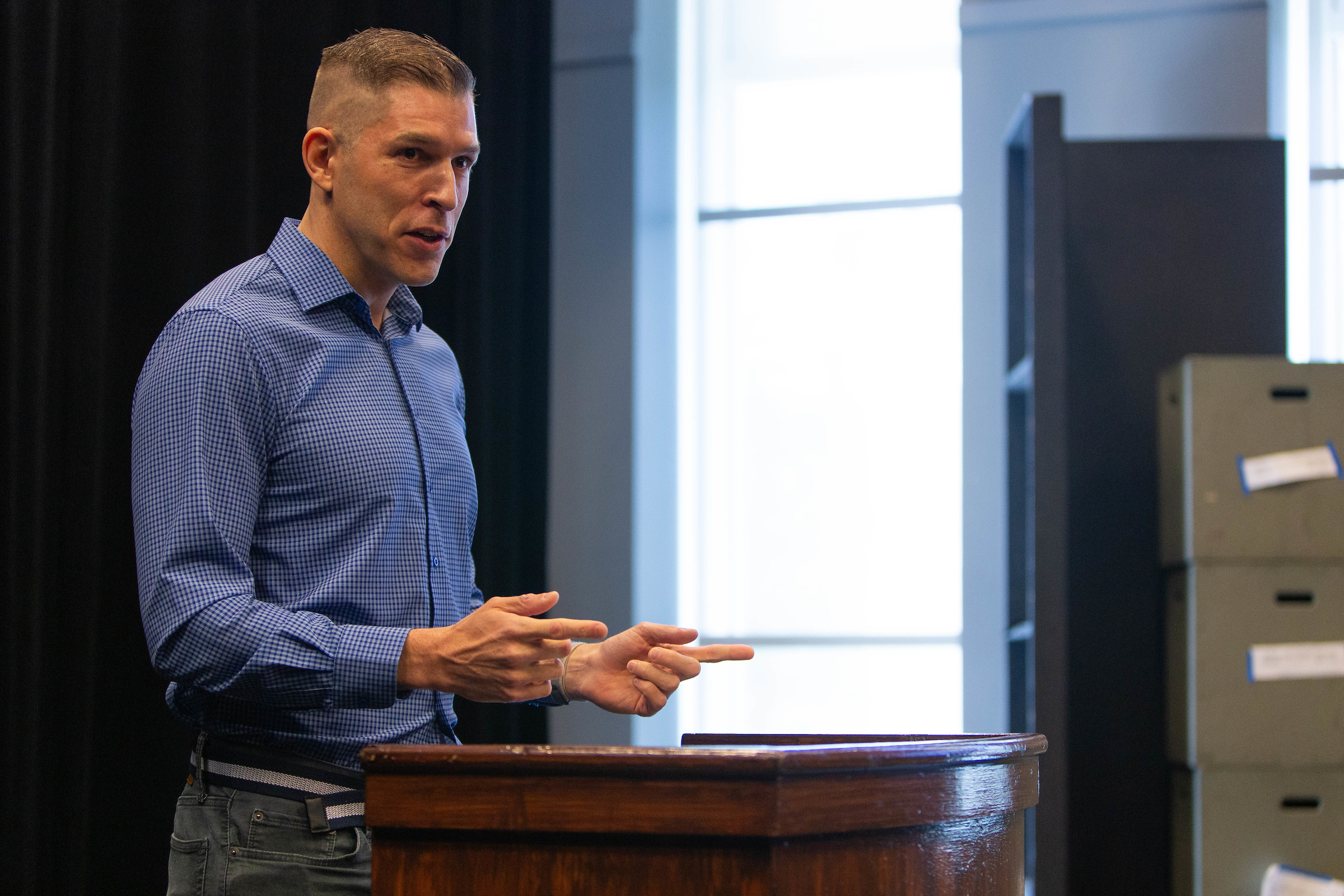 Stefan Prangenberg. (Photo by Keeton Holder/DePaul University)
Stefan Prangenberg. (Photo by Keeton Holder/DePaul University)Degree: Doctorate in Business Administration
Hometown: Near Cologne, Germany; currently resides in New York City
You grew up in Germany and are a first-generation college graduate. What led you down that path?
A story I often heard as a child was how my grandmother was excellent in school and even had the best grades in the class. However, because she was a woman growing up in the 1930s and 1940s, going to college wasn’t an option for her. I think her story inspired me to do well academically. My parents were also huge supporters of me in school. I’ve always seen education as a great vehicle to achieve my dreams. Growing up in Germany, I wanted to work in America, so I used my MBA degree to help me get to the U.S. and land my first job.
Why did you choose DePaul?
I‘m a firm believer in lifelong learning and wanted to dive deeper into the science behind business and learn applied research and innovative problem-solving methods. I chose DePaul’s Doctorate in Business Administration program for its flexibility, engagement and blend of theory and real-world application. The flexibility to live and work in New York City while taking monthly in-person classes in Chicago made choosing the program a no-brainer. The DePaul DBA will equip me with additional tools and resources to tackle complex business challenges effectively and with data.
You also taught courses at DePaul while you took classes and worked in NYC. What was that experience like?
I worked in consulting for 15 years, so when I enrolled at DePaul, I was offered an opportunity to teach a consulting class to graduate students. It’s been one of the highlights of my time at DePaul. The class provides real-world experience for students by connecting them with small businesses in Chicago. During the course, each group of students goes through the full lifecycle of a consulting engagement. They learn about a problem the client faces, diagnose it, collect data and make evidence-based recommendations to the client, ideally resulting in implementation.
It’s an incredible opportunity for students to interact with a real client. Since it’s a small business, they are often connecting with the president, CEO or other high-level leaders at the company. This allows them to grasp the full situation the company faces while also making recommendations to individuals who have the power within the company to implement those changes. At the same time, it’s great for small businesses to have free access to fresh ideas. It’s been a nice, synergetic relationship and rewarding for both parties.
What type of businesses have your students consulted with?
We had over a dozen clients from various industries, such as manufacturing, landscaping or health and safety, ranging from five to 100 employees. Several clients have returned because they enjoyed working with students and were helped by the solutions presented. Students have established social media accounts for companies, modernized websites, recommended strategies for recruiting, retention, company culture and more.
You recently defended your dissertation. What were some of your key findings?
In my dissertation, I examined how virtual work impacts employee stress and work outcomes. A significant finding was the beneficial effect of social presence — the extent to which other people are perceived as “real” and present within virtual interactions. My study found that employees who felt higher levels of social presence perceived virtual work demands more as opportunities for growth rather than as obstacles and reported increased job satisfaction and engagement. Higher levels of social presence can buffer the negative aspects of virtual work, such as feelings of isolation or reduced communication effectiveness, thereby fostering a more engaging and productive work environment. The implication for organizations is clear: strategically leverage in-office days as an opportunity for relationship building and meaningful interactions. These activities will, in turn, increase levels of social presence for future virtual interactions.
What do you like to do outside of school and work?
I haven’t been able to do much of it recently, but I grew up sailing. When I lived in Hamburg, Germany, there was a city lake that you could go sailing on after work. I also did sailing trips with family and friends across the Mediterranean. What I really like about sailing is that once you're on the boat, you're laser focused on steering the wheel or managing the sails, and everything else in your mind just disappears. This is a little bit of a spoiler alert, but my commencement address to the Kellstadt Graduate School of Business will invoke sailing as a metaphor for our DePaul journey, working in business and life.
I'm very grateful that my boyfriend Rob had my back during this intense three-year program. We both spend a ton of time with our yellow Labrador retriever, Barney, who also played a starring role in my second-year group research project about pets and loneliness during the pandemic. Barney is adorable but a handful. He wants to play ball for hours each day. I apologized to him in the acknowledgment section of my dissertation for not being able to play ball with him as much as he wanted.
Russell Dorn is a senior manager of media relations in University Communications.